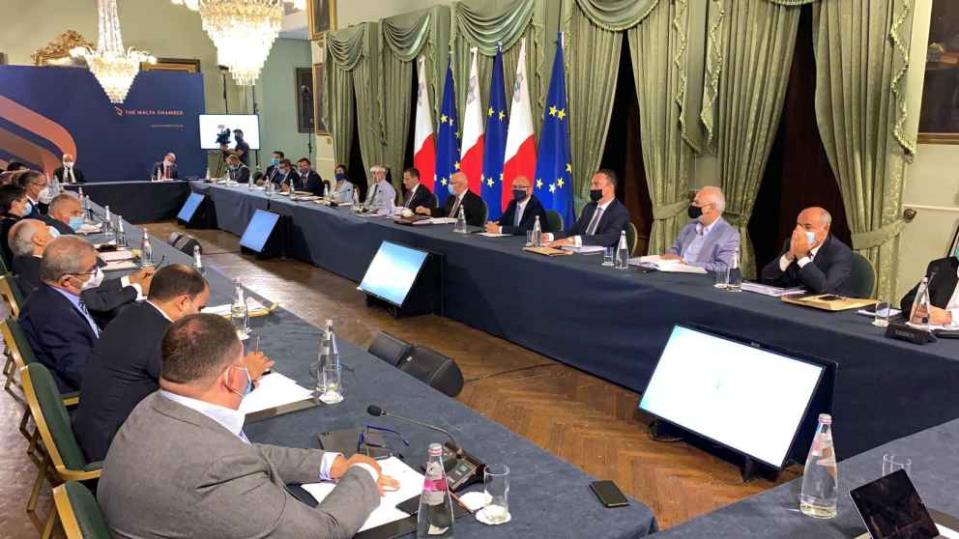This week’s cabinet meeting was held at the Malta Chamber premises, a first. In fact this was described as a historic meeting as it was the first cabinet meeting held at these premises, and also the first Cabinet meeting outside of Castille since Dr Robert Abela took over as Prime Minister. A good, cordial and fruitful meeting during which Dr Abela presented a new economic vision for the country and listed the main pillars of economic policy.
This vision was greeted with very positive comments by the Chamber and were very clear that they were totally on board with the goals and the economic model itself.
This meeting was also a clear indication that this is a Government that truly believes in dialogue, listens and above all acts and does not shy away from implementing what is the best for our country.
During the session, Prime Minister Abela named good governance, economic growth, education, better infrastructure and becoming carbon neutral by 2050 as the five main pillars of government’s economic policy.
Of course I will give priority to Education. Education enriches people’s understanding of themselves but also is fundamental for improving the quality of their lives, leading them to broad social benefits both as individuals but also as a society.
I concur that this is a sector that is crucial factor which is fundamental towards a medium and long-term vision for our country, as Education provides progress in life and, also quoting Dr Abela, in the long run, Education leads us to a strong economy.
No country can achieve sustainable economic development without substantial investment in education and human capital, which go hand-in-hand. It is education that enriches people’s standing and leads them to improve the quality of their lives. And the fundamental issue of these five main pillars is that there is no point in economic growth if we, as a society, are not living a better life.
I strongly believe that the educational provisions represent one of the main determinants of the growth of our country’s economy. It is useless having a sound economic vision without having the necessary tools – amongst them, an education system that caters for them, educators that are knowledgeable and students who are given the best opportunities leading to what is needed.
This sector needs to be further reformed. It is true that the current education system is not preparing children enough to be ready to excel in subjects such as mathematics, science, and digital science. Subjects that are central to the country’s vision for the next 10 to 20 years.
Our present education system has been with us for quite a number of years, with periodic reforms which however, as is, will not take us to what is really necessary to be at par with our economic vision. It is imperative that our very good educators are also taken into account, and given the necessary tools and professional preparedness, as there has to be added emphasis in the coming years on subjects such as life sciences, robotics, coding, software development, artificial intelligence, and industry 4.0 amongst others.
It is important stating that when mentioning these sectors, we are not talking about the future, but we are dealing with what is happening now in the industrial and manufacturing sectors.

We need to analyse our current education system and work towards further strengthening it by modernising the educational infrastructure, with particular attention to how we are preparing our educators and our students to be conversant with this economic vision. Education is one of the fundamental factors of development, and we cannot achieve anything without having an education structure which also caters for it.
The education sector is one of the pillars of the new economic policy presented this week.
Good governance is central to a healthy economy. Corruption is totally unacceptable in all levels, even in business, as there needs to be a level playing field.
All economic growth has to lead to a better quality of life. This means sustainable growth leading to quality jobs – another important sector – having more time to spend with our families, and also, as a society, being more compassionate with those who are vulnerable or those who for a reason or another, have fallen behind. Better infrastructure is another sector which is a must to have a better quality of life and attract quality investors.
Another topic discussed during this cabinet meeting which is an integral part of the new economic vision, is that of becoming carbon neutral by the year 2050, an ambitious but achievable target. Although as a country we have moved forward, but we also have to acknowledge, as Prime Minister said, that what we have done up till now is not enough. The environment is the most crucial part of this plan.
During this special cabinet meeting, we also delved into other topics, discussing them with the Chambers’ representatives, amongst them that of seeing more women involved in leadership and decision making positions in the country, noise pollution, the touristic sector, alternative means of transport and innovative mass transport systems, Malta’s digital infrastructure which also needs to improve, and others.
The World Health Organisation defines quality of life as an individual's perception of their position in life in the context of the culture and value systems in which they live and in relation to their goals, expectations, standards and concerns.
And precisely, in all of the above, there is one common factor. Moving towards a higher quality of life through this new economic vision. It is pointless achieving economic growth unless this translates to a higher quality of life - social well-being.
A better quality of life should always be a priority for everyone.